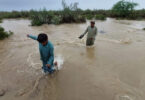F.P. Report
ISLAMABAD: Caretaker Prime Minister Anwaar-ul-Haq Kakar said that mindful of Pakistan’s susceptibility to disasters and the grim specter of climate change, the government was resolutely committed to bolstering the disaster management capabilities, enacting requisite legislation, promoting governance that was attuned to risk, erecting resilient infrastructure, and above all, fostering adaptability.
Disaster Management System in Pakistan was witnessing a transition from a reactive to a proactive approach which signified a crucial shift in how they collectively responded to unforeseen crises, the prime minister said in a message on the occasion of “National Resilience Day”, being observed on October 8. “I believe that the National Resilience Day will inspire the people of Pakistan to not only deepen their understanding of disaster risk management but also share the vital message of readiness, resilience, fortitude, and self-sufficiency,” he added.
He said previously, the focus was primarily on reacting to emergencies after they occurred, often resulting in significant loss of life and property. However, with advancements in technology and a deeper understanding of natural phenomena, Pakistan was moving towards a proactive approach, he said, adding this involved establishment of a modern National Emergencies Operation Center (NEOC) at NDMA.
NEOC had the capacity to create common operating picture enabled by multiple satellite feeds, software, Artificial Intelligence tools that would strengthen digital risk assessment, early warning systems, and preparedness strategies, he observed. The caretaker prime minister further said “Alhamdulillah, today, we have a robust institutional structure for disaster management in the form of NDMA and PDMAs.
We now, need to strengthen the Disaster Management system at the district level to evolve as the actual implementing bodies of Disaster Risk Reduction policy and plans at the local level.” He said National Resilience Day was marked on 8th October as a solemn tribute to the indomitable spirit of the people of Pakistan and Azad Jammu & Kashmir, who had borne the brunt of harrowing disasters.
“It serves as a stark reminder that we reside in a region profoundly susceptible to calamities. Pakistan ranks as one of the most vulnerable countries declared by the Climate Risk Index. We have witnessed a series of natural catastrophes in the shape of earthquakes, floods, GLOF events, scorching heatwaves and forest fires – exacting a toll on the precious lives as well as billions of dollars lost to infrastructure,” the prime minister said.
On this day, he said, they aimed to raise awareness of the devastating impacts of climate change-induced disasters with a special focus on disaster resilience. Last year, once again, he said, Pakistan bore the brunt of a climate-induced catastrophe in the form of unprecedented floods.
The province of Sindh and parts of the province of Balochistan suffered the most. One-third of the country was submerged with a toll staggering over 1700 precious lives lost, 12867 injured, and 33 million lives forever altered, he said, adding over a million valued livestock perished, and four million acres of vital crops lie ruined. The communication grid lay in tatters.
The federal and provincial governments, working in unionism, marshaled every resource within grasp – financial, administrative, and organizational – for the rescue and relief of their affected citizens, the caretaker prime minister added. “Let us move forward with determination, resolve, and a shared vision of a stronger, more resilient Pakistan. Together, we shall not only weather this storm, but emerge from it stronger and more united than even before. Together, we shall not only endure, but prevail,” he emphasised.







